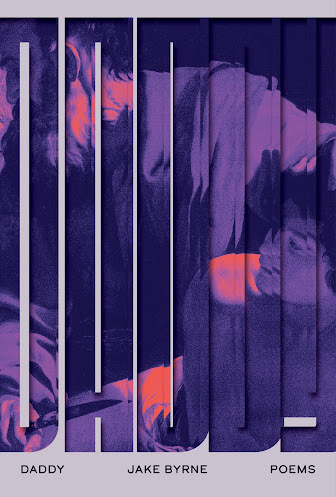Jake Byrne, Daddy: Poems
But I do try. I try sohard.
That’s why I bus to seemy therapist mid-winter.
I am seeking hisassistance with a complex project. (“PARALLEL VOLUMES”)
 Itis good to finally see a copy of Toronto poet and editor Jake Byrne’s second collection,
Daddy: Poems
(Kingson ON: Brick Books, 2024), following their full-lengthdebut,
Celebrate Pride with Lockheed Martin
(Hamilton ON: Wolsak andWynn, 2023) [see my review of such here]. Across a loop and reloop of articulated,traced and repuporsed trauma, Byrne’s poems offer a curious blend of sexualswagger, explorations through and into “patriarchy, intergenerational trauma,and queer desire” (as the back cover offers), and a degree of tenderness, includingthe very fact of the author dedicating the collection “to the memory of alittle cat / named My Sweet Princess (2018-2023).” The poems assembled here areexpansive, allowing for this large project built out of intricately-craftedsmall parts, opening with a poem of short lines held aloft by such wide openspace. “My father calls to talk about my poems,” Byrne writes, offering afour-line stanza at the top of an otherwise empty page, “and seamlesslyincorporates my words into his paranoid delusions. / He says I ought to be morecareful what I write, implies the poems / come from a demon birthing itselfthrough the vessel of my body.” This is Byrne in a further step of movingbeyond composing poems to composing books, something already evident in the umbrellaof Celebrate Pride with Lockheed Martin, a structure that encompassedthe entirety of the poems in that collection, but Daddy: Poems providesa more overt and more coherent book-length structure; and the coherence isfurther impressive through the assemblage of a variety of lyric shapes andpurposes. “My parents taught me many things the hard way.” the poem “A POEMABOUT MY PET CANARY II” offers, “But I cannot for the life of me recall / whatthe moral of this lesson was. // Do poems require moral lessons?”
Itis good to finally see a copy of Toronto poet and editor Jake Byrne’s second collection,
Daddy: Poems
(Kingson ON: Brick Books, 2024), following their full-lengthdebut,
Celebrate Pride with Lockheed Martin
(Hamilton ON: Wolsak andWynn, 2023) [see my review of such here]. Across a loop and reloop of articulated,traced and repuporsed trauma, Byrne’s poems offer a curious blend of sexualswagger, explorations through and into “patriarchy, intergenerational trauma,and queer desire” (as the back cover offers), and a degree of tenderness, includingthe very fact of the author dedicating the collection “to the memory of alittle cat / named My Sweet Princess (2018-2023).” The poems assembled here areexpansive, allowing for this large project built out of intricately-craftedsmall parts, opening with a poem of short lines held aloft by such wide openspace. “My father calls to talk about my poems,” Byrne writes, offering afour-line stanza at the top of an otherwise empty page, “and seamlesslyincorporates my words into his paranoid delusions. / He says I ought to be morecareful what I write, implies the poems / come from a demon birthing itselfthrough the vessel of my body.” This is Byrne in a further step of movingbeyond composing poems to composing books, something already evident in the umbrellaof Celebrate Pride with Lockheed Martin, a structure that encompassedthe entirety of the poems in that collection, but Daddy: Poems providesa more overt and more coherent book-length structure; and the coherence isfurther impressive through the assemblage of a variety of lyric shapes andpurposes. “My parents taught me many things the hard way.” the poem “A POEMABOUT MY PET CANARY II” offers, “But I cannot for the life of me recall / whatthe moral of this lesson was. // Do poems require moral lessons?”Daddy: Poems is constructed in two roughly-equal halves—thetitle section, and “gnostic iambic pre-exposure jockstrap jukebox prophylaxis”—eachof which offers poems that accumulate in swirls and sweeps, emotional gesturesset with a precision that holds what otherwise might flail. There might beexcess and messiness, but Byrne’s lyrics explore with such deep and empatheticclarity.
A baby is born betweenshadow and crevice
The baby cries out forthe touch of a hand
The hand delivers thesting of authority
A man doles out; a boy receives
Splitting between blackand white
I have not resolved myDADDY issues
I bring them to my bed tosleep with
Not terribly uncommon, isit (“II OF RODS”)
There’sa vibrancy to Byrne’s lyric, whatever the subject matter; an energy that can’t bedenied, making for a powerful collection on trauma, desire and how one might moveforward, even through the flailing, a flailing that might hopefully find itsway toward something more stable, certain. “sometimes you know / by the crackleof static in the air,” begins the poem “event coordinator moving into / projectmanagement,” “the vibrations in the puddles / on the sopping sauna floor. / ihad so rarely felt the virtues of a / tall white man before marco.”



